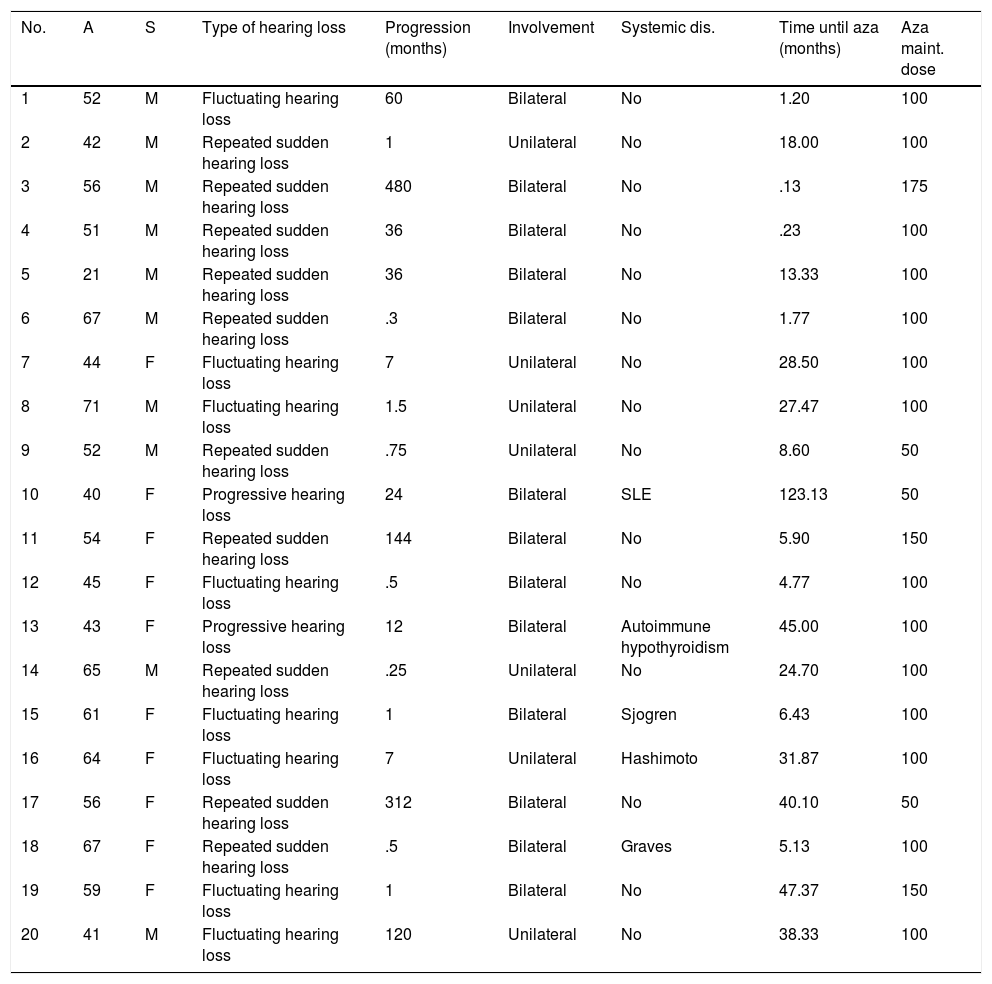Current schemes for treatment of immune-mediated hearing loss with sporadic short-course, low-dose corticosteroids, are insufficient.
MethodsTo determine the role of azathioprine in the control of auditory impairment, a longitudinal, observational, descriptive study was performed with 20 patients treated with azathioprine (1.5–2.5mg/kg/day into two doses) for 1 year. The loss of 10dB on two consecutive frequencies or 15dB on an isolated frequency was considered as relapse.
ResultsThe mean age of the patients was 52.50 years (95% CI: 46.91–58.17), half were women. Bilateral affectation was 65%. 75% had organ specific disease and 25% had systemic autoimmune disease. The difference between baseline PTA (46.49dB; DS 18.90) and PTA at 12 months (45.47dB; DS 18.88) did not reach statistical significance (P=.799). There was a moderate positive correlation between female sex and the presence of systemic disease (R=.577). By applying Student's t for paired data, a significant difference (P=.042) was obtained between the PTA in frequencies up to 1000Hz (PTA 125–1000Hz). The relative incidence rate of relapse per year was .52relapses/year (95% CI: .19–1.14]). The median time to audiometric relapse-free was 9.70 months (DS 1.03).
ConclusionsAzathioprine maintains the hearing threshold, decreases the risk of relapse, and slows down the rate at which patients relapse, altering the course of immune-mediated inner ear disease.
Los esquemas actuales de tratamiento de la hipoacusia inmunomediada con corticoides, a dosis baja y pauta corta, son insuficientes.
MétodosPara determinar el papel de la azatioprina en el control del deterioro auditivo se ha llevado a cabo un estudio observacional descriptivo longitudinal con 20 pacientes tratados con azatioprina por vía oral (1,5-2,5mg/kg/día en dos dosis) durante 1 año. Se consideró recaída la pérdida de 10dB en dos frecuencias consecutivas o de 15dB en una frecuencia aislada.
ResultadosLa edad media de los pacientes fue de 5250 años (IC 95%: 46,91-58,17), y la mitad fueron mujeres. La afectación bilateral fue del 65%. Un 75% presentaban enfermedad organoespecífica y un 25%, enfermedad autoinmune sistémica. La diferencia entre la PTA basal (46,49dB; DE 18,90) y la PTA a los 12 meses (45,47dB; DE 18,88) no alcanzó significación estadística (p=0,799). Existía una correlación positiva moderada entre sexo femenino y presencia de enfermedad sistémica (R=0,577). Aplicando t de Student para datos apareados se obtuvo una diferencia significativa (p=0,042) entre el descenso de la PTA en frecuencias hasta 1.000Hz (PTA 125-1.000Hz). La tasa relativa de incidencia de recaída por año fue de 0,52 recaídas/año (IC 95%: 0,19-1,14). El tiempo medio de supervivencia libre de recaída audiométrica fue de 9,70 meses (DE 1,03).
ConclusionesLa azatioprina mantiene el umbral de audición, disminuye el riesgo de recaída y frena la velocidad con la que los pacientes recaen, alterando el curso de la enfermedad inmunomediada del oído interno.













